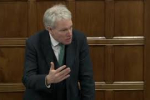
On Wednesday this week the Illegal Migration Bill passed its remaining stages in the House of Commons. The purpose of the Bill is to break the business model of the people smuggling gangs who charge thousands of pounds to people to travel illegally and dangerously from France to England, where they then claim asylum, or claim to be victims of modern slavery, or both. The Bill will ensure that illegal immigrants are detained and swiftly removed, either back to their own country or to a safe third country like Rwanda.
This simple principle - that you cannot make a life in the UK by arriving illegally and claiming asylum - is the foundation of the fair, generous and humane refugee policy that we need. It is the precondition for a system of safe and legal routes, similar to the ones we have in place already and which have since 2017 brought to the UK nearly half a million people fleeing war and persecution around the world; the process for developing a new legal routes system is also set out in this Bill.
I was involved in discussions with Government which led to some useful improvements to the Bill, to ensure the opportunities for lawyers to exploit loopholes in domestic and European law to stop the removal of illegal immigrants. I think the Bill is now as strong as it can be, consistent with our international obligations to the European Convention on Human Rights and the Refugees Convention.
I appreciate that many people feel that denying asylum to people who have travelled here from war zones is inherently immoral. I am afraid I don't agree. In an age of mass people movements - there are tens of millions of displaced persons around the world, and even more who would willingly move to the West if they could - we need to manage access to the UK in a fair but robust manner. The offer of a home in the UK to anyone who can get here is an inducement to dangerous and criminal activity. It discriminates against people who cannot afford, or physically manage, to make the journey. And unless one thinks there should be no limits to the numbers we take - that there should be no borders around the UK at all - at some point it will be necessary to deny entry to would-be immigrants; and for those people who continue to arrive illegally then the options are the ones we have now, whether to return them (to their home country or to France) or remove them (to Rwanda or elsewhere).
I spoke in the debate this week and explained my concerns with the wider system of European human rights jurisdiction that we are in. You can watch the speech here.
My view is that the system designed in the aftermath of World War Two is no longer suitable in an age of mass migration. To fulfil the clear moral responsibilities that wealthy countries have to the desperate and destitute, we need to work with our allies and with the UN to design a new global framework for refugees. But at the heart of this system is the right and responsibility of nations to manage their own borders.





